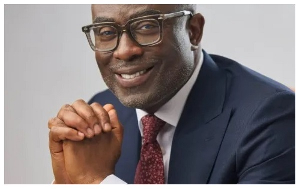- Home - News
- TWI News | TV
- Polls
- Year In Review
- News Archive
- Crime & Punishment
- Politics
- Regional
- Editorial
- Health
- Ghanaians Abroad
- Tabloid
- Africa
- Religion
- Election 2020
- Coronavirus
- News Videos | TV
- Photo Archives
- News Headlines
- Press Release
General News of Tuesday, 2 May 2006
Source: Ghanaian Chronicle
MPs as Ministers: Judges in their courts
The former 2nd Deputy Speaker of Parliament, Kenneth Dzirasah, has described as ridiculous the situation where cabinet ministers take decisions in cabinet and come to parliament to defend such decisions and vote on them.
?Obviously judges in their courts?.
He added that where all ministers were also drawn from parliament, there would be the situation of over-burdening those office holders and also totally undermining the practice of separation of powers under which the executive could be held accountable.
Ken Dzirasah said this when he addressed parliamentary reporters in Ho over the weekend and delivered a paper on ?building the image of the legislature as an independent institution ? the role of the media?.
He stated that a media that carries a predetermined agenda into parliament can only undermine the credibility of the entire legislature.
He said it is about time parliamentarians and the media consider each other as partners in development and together strive to eliminate those factors that account for our under-development.
He mentioned that the media should appreciate the fact that parliamentarians come from culturally diverse backgrounds with varying levels of skills and appreciation of the intricacies of government.
?By virtue of this diversity our levels of accommodation of criticism and even plain insults vary?.
The South Tongu MP has therefore craved the indulgence of the media to be circumspect in its dealings with parliament because unnecessary comments bring the house into disrepute and at times mobilise public opinion against them.
He reiterated that for the media to play any credible role in building the image of the legislator as an independent institution, the must see itself more as a partner and collaborator in development.
He said the analogy that the ?minority would have its say and majority will have its way? can only make the house a tool in the hands of the executive.
?As a house, we must develop the culture of self-criticism, borrow from best practices and strengthen our oversight functions by not assuming that the executive will do what is right?.
The MP observed that as a nation, we do not put premium on elective offices because below the Chief Justice, the order of precedence is left to speculation even to the extent that the DCE is acknowledged before an MP at public functions.
This practice, he said, is so because the former would be subsequently appointed as minister.
On his part, the director of Public Affairs of Parliament, Mr. Jones Kugblenu, said the media helped inform legislators of the citizens interest and vice versa. An educated public can then take the information they learn about their representatives.
This information, he added, takes the electorates to the voting booth on election day to make a legislator accountable for whether he has been a good representative of their interests or not.
Opinions









